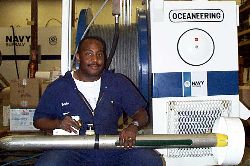 Bervin Jenkins knew early on what he wanted to do and has taken a direct route in pursuing his career. He joined the U.S. Navy directly from high school, went through its electronics and sonar schools for eighteen months, and then spent the next four years on a Navy submarine as a sonar technician. After leaving the Navy, he joined Oceaneering International, where he continues to work with sonar equipment.
Bervin Jenkins knew early on what he wanted to do and has taken a direct route in pursuing his career. He joined the U.S. Navy directly from high school, went through its electronics and sonar schools for eighteen months, and then spent the next four years on a Navy submarine as a sonar technician. After leaving the Navy, he joined Oceaneering International, where he continues to work with sonar equipment.
“As a lead electronics technician, I’m responsible for troubleshooting and operating side scan sonar systems,” Jenkins explains. The sonar systems are used to survey the sea floor in search and recovery missions.
Oceaneering holds a contract with the Navy (NAVSEA SUPSALV Directorate) to do search and recovery, so when the Navy is asked to locate a lost airliner or helicopter, for example, it tasks Oceaneering. The Navy gives the company coordinates for the area where the missing object is believed to be, then Jenkins and his colleagues set up a search grid and search the area with sonar. The side scan sonar operates from a “towfish” – a torpedo-shaped underwater vehicle that is hooked to the ship by a cable and towed along behind it.
"As a lead electronics technician, I’m responsible for troubleshooting and operating side scan sonar systems"
Most of his Navy education was right on target for Jenkins’ current job. “The electronics and sonar training were most relevant,” he says. “It is really important to understand the way sound travels and acts in water.” Almost all the equipment he uses is electronic, so that training was vital, also.
Jenkins has been to Africa, the Dominican Republic, and all around the U.S. with his work, and values this travel experience. The responsibilities associated with his position mean that he sometimes works long hours, however. “When we’re out on a call we work twelve hour shifts,” he explains. “And if equipment breaks, we work until we fix it.” Still, he loves his job.
Jenkins suggests that training programs for marine technicians should include as much on-the-job experience as possible. “Students should see the rough sea conditions, how we use the electronics, our search techniques – that kind of thing,” he says. “It’s good to want to be a marine technician, but they need to understand what it’s really like.”
<< Back to Profiles Start Page
|
|
